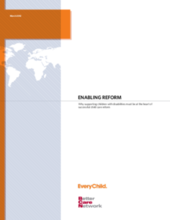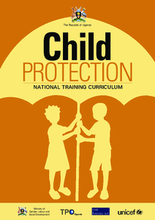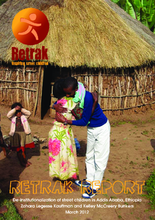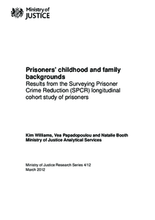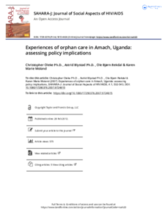Demographic Data
|
Sources: World Bank, UNDP, UNAIDS, DHS 2013 |
Displaying 12841 - 12850 of 14390
Hope and Homes for Children has been implementing ACTIVE Family Support in Sarajevo Canton in BiH since 2003. The program consists of two elements: the prevention of separation of children from their parents as the primary focus, and the reintegration of separated children from institutions back into their biological families. This unique and holistic program is tailored to the individual needs of each child and family and it is built on the following core values: partnership, respect, inclusion, sustainability and the best interest of the child.
In this article, the authors briefly review the history of institutional care and surrogate care. They then discuss why institutional care is at odds with children’s needs, and review the empirical evidence regarding the effects of institutional care on young children’s development.
The paper provides a clear agenda for action for reversing the neglect of childhood disability in child care reform and points towards several key policy recommendations.
This study used the National Survey of Child and Adolescent Well-being (NSCAW, long term foster care general sample) data set to examine foster child and caregiver characteristics, and the caregiver–child relationship as a predictor of placement stability.
Over the past two decades of humanitarian work in northern Uganda, national and international child-focused organisations as well as government departments responsible for children have built a rich body of knowledge that has informed child protection work throughout the country. The development of this Child Protection Curriculum and related training materials is therefore a first step by the Ministry of Gender, the Ministry of Labour and Social Development, the United Nations Children’s Fund (UNICEF), the Child Protection Working Group in Uganda, and selected academic institutions to professionalise the child protection sector within the broader realm of social work in Uganda.
The study was carried out in Addis Ababa, Ethiopia. The purpose of this research is to utilise information collated from literature review as well as informant interviews and focus group discussions to identify good practices or help inform the development of such practices aimed at assisting street children currently residing in institutional care to return to a family-based environment.
This report presents findings of a study on the childhood and family backgrounds of 1,435 participants who were newly incarcerated in 2005 and 2006 in the United Kingdom. The report has a special focus on the experiences of abuse and care placement in childhood.
The National Family Preservation Network (NFPN) recently released its family assessment tool designed for use in Least Developed Countries (LDC). The tool aims to help a variety of workers serving families in least developed countries by providing methods and approaches to enhance family strengthening.
In the next few years, the Rwandan government hopes to close the majority of the country’s children’s homes. Rwanda’s so-called "child deinstitutionalization" (DI) policy, which, despite initial concerns, is attracting global support.
This paper presents findings from a study on the experiences of orphan care among Langi people of Amach sub-county in Lira District, northern Uganda, and discusses their policy implications.


